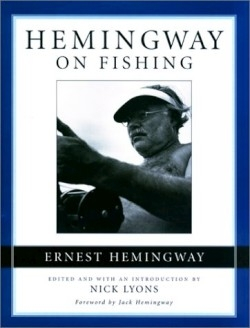Hemingway on Fishing
This collection of twenty-one excerpts, short stories, and magazine and newspaper articles reinforces that, above all, Hemingway the writer is inseparable from the mystically large and fascinating character who’s portfolio of enthusiasms knew no bounds. Hemingway On Fishing is a delightful compilation for the Papa buff as well as the literature-minded angler who reads when not fishing. Hemingway’s prose is unexpectedly fresh, even when weighed against newer outdoor writing. The best contemporary writer on fishing, Tom McGuane, The Longest Silence, seems unsteady and effete in comparison to the fullness of Hemingway on his game. What McGuane achieves with intimacy and exactitude, Hemingway overwhelms in fits of vigor.
“When you are drifting, out of sight of land, fishing four lines, sixty, eighty, one hundred and one hundred fifty fathoms down, in water that is seven hundred fathoms deep you never know what may take the small tuna that you use for bait, and every time the line starts to run off the reel, slowly first, then with a scream of the click as the rod bends and you feel it double and the huge weight of the friction of the line rushing through that depth of water while you pump and reel, pump and reel, pump and reel, trying to get the belly out of the line before the fish jumps, there is always a thrill that needs no danger to make it real.” (“On The Blue Water: A Gulf Stream Letter,” Esquire, April, 1936)
This excerpt was Hemingway’s response to a friend who dismissed angling as lacking in the excitement that, say, one experiences when being charged by an elephant. Editor Lyons says Papa upped the dosage by carrying a “Thompson submachine gun on board the Pilar, which he used with glee to kill sharks.”
It should be remembered that Hemingway fished in an entirely different era than today’s contexture of carbon fiber rods, global positioning satellite navigation, electronic fish finders, helicopter day trips, and especially, the literary world’s enchantment with fly fishing. To be sure, Hemingway would have found the current rave of flats fishing with a fly for the barely edible bonefish or permit to be utterly vapid. He was not above baitfishing with worms or grasshoppers and his penchant for killing everything he caught sounds so authoritatively prescriptive as to escape criticism.
At times the prose and imagery is breathtaking. In the story, “Now I Lay Me,” Hemingway places an injured Nick Adams seven miles behind the front lines of the Spanish Civil War battling a preternatural type of insomnia. “I myself did not want to sleep because I had been living for a long time with the knowledge that if I ever shut my eyes in the dark and let myself go, my soul would go out of my body.” This premise supports a brilliant segue into his lying awake at night recounting a handful of trout streams, log by trout-holding log, and ends with Adams admitting, “Some nights too I made up streams, and some of them were very exciting, and it was like being awake and dreaming. Some of those streams I still remember and think that I have fished in them, and they are confused with streams I really know.”
Lyon’s divides the book into three sections, the first of which, From Up in Michigan to the Pyrennes, includes seven freshwater works of fiction: five Nick Adams stories, and excerpts from A Moveable Feast and The Sun Also Rises. Section II collects eleven articles that appeared in various magazines and newspapers, (i.e., Esquire, Vogue, Holiday, Look, Toronto Star Weekly and Toronto Daily Star) between 1920 and 1936. Easily the most bizarre of these works is a piece in Esquire in which Hemingway relates how he manages to shoot himself through both calves with a .22 pistol while gaffing a shark. Lastly, Section III comprises three more excerpts from among Hemingway’s greatest works, The Garden of Eden, Islands in the Stream, and The Old Man and the Sea.
The Foreword by Jack Hemingway, Ernest’s son, is candid without offering any new, personal narrative on his famous father, whereas Lyons’ warm introduction showcases just how influential a role fishing served in Hemingway’s life. In all, publisher, writer, angler, Lyons has compiled a remarkably complete and satisfying book, confirming that he is the right individual to mastermind this project. Hemingway On Fishing should serve to enlighten many unsuspecting readers to the unmatched richness of Ernest Hemingway. One is reminded of the prescient words of Wystan Hugh Auden, “Some books are undeservedly forgotten; none are undeservedly remembered.”
Reviewed by
Caroline Sinkinson
Disclosure: This article is not an endorsement, but a review. The publisher of this book provided free copies of the book to have their book reviewed by a professional reviewer. No fee was paid by the publisher for this review. Foreword Reviews only recommends books that we love. Foreword Magazine, Inc. is disclosing this in accordance with the Federal Trade Commission’s 16 CFR, Part 255.

